|
|
|
Sort Order |
|
|
|
Items / Page
|
|
|
|
|
|
|
| Srl | Item |
| 1 |
ID:
170441
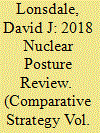

|
|
|
|
|
| Summary/Abstract |
The 2018 Nuclear Posture Review (NPR) represents a significant shift in U.S. nuclear weapons policy. Using Cold War vintage theory, this article assesses whether the NPR signals a return to nuclear warfighting. The NPR is assessed against five primary drivers for warfighting strategy: enhanced deterrence; to deal with deterrence failure; to maximize damage limitation; to provide a theory of victory; and adherence to just-war theory. The article concludes that although the NPR represents a step in the direction of warfighting, it does not fully embrace it. This is primarily because the NPR fails to endorse an unrestrained theory of victory.
|
|
|
|
|
|
|
|
|
|
|
|
|
|
|
|
| 2 |
ID:
170461


|
|
|
|
|
| Summary/Abstract |
Although American leadership of NATO had been a constant over the entire postwar period, after the Soviet threat evaporated in the 1990s Americans began a process of reassessing the necessity and desirability of this leadership as well as the American return on its investment in NATO. Europeans, in turn, enjoyed a policy emancipation allowing them to follow the U.S. lead, resist (or reject) it when American policies violated European interests or, as a precautionary measure in the event of American abandonment, acquire strategic autonomy within the European Union. The persistence and credibility of American leadership of NATO after Kosovo, as well as episodic European challenges within and outside NATO, cannot be understood without reference to the structural and institutional factors preventing the American abdication of its leadership role within NATO or the European ability to reject it unconditionally. I find that material conditions for American leadership remain unimpaired, but the credibility of American leadership as it pertains to the confidence the allies have in U.S. willingness to fulfill its Article 5 commitment has suffered potentially irreversible damage. Yet it is institutional factors, particularly the institutional stickiness bonding the American foreign policy elite to a NATO-centric security system and the positive externalities attending institutional negentropy, that have played an outsized role in maintaining NATO’s cohesion and legitimacy. They have also raised the cost of substituting European strategic autonomy for American leadership or the abandonment of it. The Europeans have sought a precautionary defense autonomy to cope with non–Article 5 threats of peripheral interest to the United States but they have remained willing to follow the American lead on matters touching collective defense and deterrence in Europe. Future American grand strategy, currently undergoing vigorous debate inside and outside government, will have a fundamental impact on NATO’s centrality to U.S. foreign policy calculations as well as the desirability or necessity of U.S. leadership, independent of a European desire for or acquisition of strategic autonomy. The choice of strategy poses the greatest threat to NATO’s long-term cohesion, American willingness to remain entangled in European affairs, and American leadership in Europe.
|
|
|
|
|
|
|
|
|
|
|
|
|
|
|
|
| 3 |
ID:
170457


|
|
|
|
|
| Summary/Abstract |
The relationship between the Russian Federation and the People’s Republic of China is one of great complexity and importance to policymakers tasked with forming U.S. foreign policy. Considering the long-term implications for U.S. strategy, the research seeks to anticipate future trends in the Sino/Russia relationship using scenario planning techniques to develop four distinct yet impactful scenarios for policymakers to consider. From a list of highlighted “driving forces” in the Sino/Russia relationship, the research points to two critical uncertainties (U.S. policy and Central Asia) that could dictate the future relationship between the two powers. The scenarios include hypothetical events in a multitude of areas, which could have significant consequences for the two countries. The study recommends a change in U.S. policy that accounts for the growing environmental and technological tensions that are driving current geopolitical unrest in the developing world and suggests that a change is taking place in how the global community defines, conceptually, the role of great-power politics
|
|
|
|
|
|
|
|
|
|
|
|
|
|
|
|
| 4 |
ID:
170452
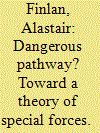

|
|
|
|
|
| Summary/Abstract |
This article explores what is considered by some to be a dangerous pathway: the development of a theory of special forces. The world is now in the third age of special forces and these secret military units are at the forefront of the use of force in international relations. This research identifies a large theory-knowledge gap concerning these military “first responders” for modern nation-states and offers a tentative theory of special forces that goes beyond traditional annihilation/attrition models of war toward a new anaphylaxis model. It makes the case that the theory pathway is not dangerous, but emancipatory.
|
|
|
|
|
|
|
|
|
|
|
|
|
|
|
|
| 5 |
ID:
170451
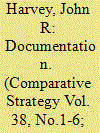

|
|
|
|
|
| Summary/Abstract |
I want to thank the Exchange Monitor folks for inviting me to speak today at the pre-conference workshop. I do so in fond memory of Ed Helminski, the founder of this annual summit, who was a champion of the nuclear deterrent throughout his career.
|
|
|
|
|
|
|
|
|
|
|
|
|
|
|
|
| 6 |
ID:
170459
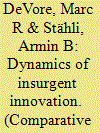

|
|
|
|
|
| Summary/Abstract |
Few issues are more important to security-studies scholars than understanding how violent non-state groups innovate. To shed new light on this subject, we examine Hezbollah’s innovations and the underlying processes that produced them. Based on this case, the most successful violent non-state groups are arguably those that systematically pursue incremental innovation. Although less dramatic than their discontinuous counterparts, a commitment to steadily improve an organizations' tactics and techniques can have dramatic effects. Indeed, even Hezbollah’s remarkable performance during the 2006 Lebanon War is attributable to the perfection of techniques utilized since the organization's inception. While innovations were incremental in character, a bottom-up process of learning and experimentation by field commanders was critical to generating most of these innovations. If generalizable to other violent non-state actors, these findings suggest that the most formidable insurgent and terrorist groups will actually be those that relentlessly pursue incremental innovations in a bottom-up fashion.
|
|
|
|
|
|
|
|
|
|
|
|
|
|
|
|
| 7 |
ID:
170467
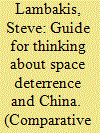

|
|
|
|
|
| Summary/Abstract |
U.S. space systems are the backbone of the U.S. economy and national security. Chinese counter-space weapon developments promise to make the satellite protection mission ever more challenging. There are significant challenges to deterring China from aggressive behavior in space, and for this reason U.S. policy makers and defense planners must start planning now for a possible future military confrontation involving China that also may involve military space contingencies. The purpose of this report is to provide a framework for thinking about deterrence and the protection of U.S. space assets.
|
|
|
|
|
|
|
|
|
|
|
|
|
|
|
|
| 8 |
ID:
170468


|
|
|
|
|
| Summary/Abstract |
Socio-economic factors have begun to upset the balance of military power between Greece and Turkey, a key defense strategy which Greece has relied upon to maintain peace with its neighbor. Provided that current trends continue, it is estimated that Greece will have difficulties in matching symmetric military Turkish threats in the near future. As such, the present article recommends a three-phase model to bring change in culture and doctrine within the Hellenic National Defense Forces, and thus aims to trigger innovative solutions that will allow Greece to confront Turkey’s extensive armament programs before the balance of power reverses in Turkey’s favor.
|
|
|
|
|
|
|
|
|
|
|
|
|
|
|
|
| 9 |
ID:
170455


|
|
|
|
|
| Summary/Abstract |
At the end of World War II, the United States and the United Kingdom continued their intelligence-sharing efforts by signing the British-U.S. Communication Agreement, later renamed UKUSA. The purpose of the agreement was to streamline the intelligence-sharing process between the two nations in order to better handle global threats, most notably the Soviet Union. The addition of Canada, Australia, and New Zealand led to what is now known as the Five Eyes Alliance. Despite its global reach and close collaboration, the Five Eyes Alliance is constrained by its small membership and overburdened by current and developing global issues that need constant, up-to-date intelligence to address them. Therefore, it could be advantageous for the Five Eyes Alliance to consider expanding its membership to include Germany, France, and South Korea. This article provides a background for understanding the historical evolution of the UKUSA agreement, examining its advantages and disadvantages, before advocating for the addition of Germany, France, and South Korea to the alliance because the benefits of their membership would outweigh any potential disadvantages.
|
|
|
|
|
|
|
|
|
|
|
|
|
|
|
|
| 10 |
ID:
170456


|
|
|
|
|
| Summary/Abstract |
This article challenges the increasingly dominant narrative of an inevitable quest for supremacy in contemporary East Asia. It argues that the narrative rests on a foundation of power transition theory that is conceptually and historically flawed, and that it risks an unnecessary war. The article contends that strategists should instead start thinking about constructing a system in which power and privileges in East Asia are held in equilibrium in a manner conceptually similar to the associative balance/shared hegemony of the Long Nineteenth Century. In such a system, Asia would not be “America’s,” but neither would it be “China’s.”
|
|
|
|
|
|
|
|
|
|
|
|
|
|
|
|
| 11 |
ID:
170443
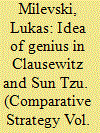

|
|
|
|
|
| Summary/Abstract |
In mutual comparison, both Clausewitz and Sun Tzu have been critiqued for their individual notions of genius and of promises of victory, respectively. Yet both critiques are beside the point, as they misunderstand both Clausewitz’s intellectual environment and the cultural milieu of ancient China in which Sun Tzu wrote. This article first provides an overview of Clausewitz’s idea of genius, particularly within the context of Enlightenment theories of war, before discussing the traditional supernatural conception of genius in ancient China, into which Sun Tzu’s work fits. The two concepts are then compared step-by-step through the process of strategic performance.
|
|
|
|
|
|
|
|
|
|
|
|
|
|
|
|
| 12 |
ID:
170446


|
|
|
|
|
| Summary/Abstract |
Nuclear weapons are the most efficient means by which an adversary could annihilate the state of Israel. The elimination of nuclear weapons is therefore in Israel’s strategic interest. Israel should lead efforts to achieve a Middle East nuclear weapon–free zone (NWFZ) and accede to the Nonproliferation Treaty (NPT) as a non–nuclear weapon state (NNWS). Such a policy would reduce the risk of Iran and certain Arab states developing nuclear weapons. In place of nuclear deterrence, Israel can take assurance from its advantages in intelligence, missile defense, and superior conventional military power projection capabilities.
|
|
|
|
|
|
|
|
|
|
|
|
|
|
|
|
| 13 |
ID:
170444


|
|
|
|
|
| Summary/Abstract |
In 1973, at the age of 44 and the height of the Cold War, James Schlesinger was confirmed as the 12th U.S. Secretary of Defense. While serving as Defense Secretary, Dr. Schlesinger implemented important nuclear policy developments designed to strengthen the deterrence of war and the assurance of allies. His 1974 adjustments to U.S. nuclear policy, known as the Schlesinger Doctrine or the Schlesinger Shift. The Schlesinger Doctrine advanced the basic parameters of U.S. nuclear deterrence policy that contributed to the peaceful ending of the Cold War and have remained constant across Republican and Democratic administrations to the present. It is hard to conceive of a more significant defense-policy legacy.
|
|
|
|
|
|
|
|
|
|
|
|
|
|
|
|
| 14 |
ID:
170464
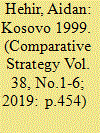

|
|
|
|
|
| Summary/Abstract |
This article argues that the optimism about the future of humanitarian intervention prevalent post-Kosovo in 1999 stemmed from a fundamental misreading of the underlying dynamics that impelled that intervention. The intervention in Kosovo was welcomed because it was said to have occurred due to a confluence of two factors, the leverage exercised by global civil society and the power wielded by the West. I argue that, while global civil-society activists unsurprisingly welcomed the intervention because it cohered with their normative vision of humanitarian intervention, the actual influence of global civil society on the decision to intervene was minimal. Likewise, the then prevalent belief in the immutable primacy of the West and its inherent commitment to the protection and promotion of human rights has proved mistaken in the years since, as Western power has waned and Western support for human rights has been selective rather than principled. Having highlighted how these two core features of post-Kosovo optimism have fared since 1999, I illustrate these trends through an examination of the fate of the responsibility to protect (R2P), which emerged as a direct result of the controversy surrounding the Kosovo intervention.
|
|
|
|
|
|
|
|
|
|
|
|
|
|
|
|
| 15 |
ID:
170465


|
|
|
|
|
| Summary/Abstract |
Debates surrounding the appropriateness of “humanitarian intervention” remain a key feature of the post-Kosovo international security environment. NATO has attempted, in the past, to intervene on “humanitarian” grounds, both in Kosovo in 1999 and Libya in 2011. By systematically comparing both operations—analyzing three related phases, namely the pre-intervention justifications offered, the manner in which NATO, and particularly the United States, sought to intervene, and the level of commitment shown in the post-intervention phase—it is clear that the best that Western organizations and efforts can hope for is “limited humanitarianism,” even with the added boosts—in the case of Libya—of a cleaner international mandate from the United Nations Security Council and normative support from the relatively newly minted but already damaged concept of responsibility to protect (R2P). There are lessons for future operations of this nature.
|
|
|
|
|
|
|
|
|
|
|
|
|
|
|
|
| 16 |
ID:
170463


|
|
|
|
|
| Summary/Abstract |
NATO’s crisis management engagement came of age in the Kosovo crisis of 1999, as the alliance committed fully to this role in its 1999 Strategic Concept and consequently inscribed the engagement in the Euro-Atlantic security architecture it sought to refine in subsequent years. The war in Afghanistan brought change as NATO at first sought to implement its crisis management principles and then, when it ran into policy failure, accepted the Americanization of its strategy and ultimately sought to reformulate its principles in more modest terms. Where Kosovo lessons were initially seen in European security management terms, their subsequent limitations on the wider global stage impacted NATO’s broader transformation for twenty-first-century security and defense operations. NATO is today still coming to terms with the experience.
|
|
|
|
|
|
|
|
|
|
|
|
|
|
|
|
| 17 |
ID:
170450


|
|
|
|
|
| Summary/Abstract |
This article offers a preliminary checklist for identifying the geopolitical motivations of decision makers responsible for major famines, events defined as economic and social crises causing one million or more excess deaths. Three geopolitical motivations are identified in three major famines in the twentieth century. The 1932–1933 Ukrainian famine illustrates the strategy of starving a geographically concentrated, politically distrusted minority into submission and repopulating areas with politically trustworthy settlers and indoctrinated or assimilated traumatized famine survivors. The 1943 Bengal famine illustrates the starvation of politically distrusted populations in areas likely to be lost to invasion to make consolidation of that conquest expensive and to impede further conquest. The 1994–1995 North Korean famine illustrates the starvation of population in areas that pose a lesser risk of catastrophic regime delegitimation. Given the near certain decrease in grain production and probable declines in livestock production and fish catch in the Global South anticipated with climate change, decision makers are likely to be tempted to execute major famines to realize these geopolitical objectives. The geopolitical advantage from major famine thus merits the attention of famine-studies scholars.
|
|
|
|
|
|
|
|
|
|
|
|
|
|
|
|
| 18 |
ID:
170469


|
|
|
|
|
| Summary/Abstract |
The European defense-industrial panorama is rapidly changing. Among all the initiatives conducted, the European Defense Fund (EDF) and the Permanent Structured Cooperation (PeSCo) in defense can be easily considered as proof of a revived interest in defense-industrial cooperation. Given this European activism, it is not surprising that the academic literature has focused on the main actors and the main strategic and economic drivers that have spurred European defense-industrial cooperation. However, the scholarly literature on the topic has erroneously over-emphasized the cooperative elements, while underestimating the peculiarities of a policy-field which remains characterized by both cooperative and competitive dynamics. Indeed, notwithstanding the presence of stable alliances, common regulations in defense procurement and a number of transnational business groups, the European defense-industrial field remains also fragmented in terms of both supply and demand. The article has two goals: first, it proposes a Liberal-Intergovernmentalist research agenda to explain the complex mix of cooperation and competition in this policy-field. Second, it aims to reflect on methodological issues in studying European armaments policies. Overall, the article wants to stimulate a constructive discussion, both from a theoretical and a methodological point of view, on a peculiar policy area that acts as an interface of industrial, technological and defense policies and lies at the intersection of International Relations (IR) traditional distinction between low and high politics.
|
|
|
|
|
|
|
|
|
|
|
|
|
|
|
|
| 19 |
ID:
170458
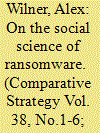

|
|
|
|
|
| Summary/Abstract |
Ransomware is a type of malware that either encrypts or steals digital data and demands a financial ransom from the victim in order to release or return them. While criminals have been linking theft and hostage-taking to ransoms for a long time, the frequency and severity of contemporary ransomware, the nature and motivation of the perpetrators who use these methods of attack, and the type of targets victimized by these attacks – from federal governments to city municipalities, and from private companies to private citizens – suggests that ransomware be afforded much greater scholarly attention by social scientists. Ransomware is not solely a computer science problem. It is a security problem that has international, political, intelligence, and diplomatic ramifications. This article provides a detailed description of ransomware tailored to the social sciences. Using seven ransomware case studies, the article breaks down the technology's technical barriers, making ransomware more accessible to public policy and national security debates and analysis.
|
|
|
|
|
|
|
|
|
|
|
|
|
|
|
|
| 20 |
ID:
170439


|
|
|
|
|
| Summary/Abstract |
The study of arms control over the past century is replete with hundreds of books and reports which examined the need for, negotiation of, verification of, and continuation of arms control treaties and agreements. The literature is somewhat less voluminous on the study of compliance with arms control treaties, and smaller still with studies that explain why countries or leaders choose not to comply.
|
|
|
|
|
|
|
|
|
|
|
|
|
|
|
|
|
|
|
|
|